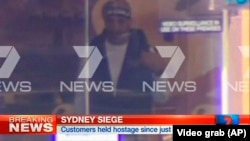The Australian government plans to monitor social media in real time to try to combat terrorist propaganda on the Internet.
Ministers said the effort will help authorities identify and dismantle online messages of hate from groups such as Islamic State.
One of Canberra’s most pressing security concerns is homegrown extremism, and the ability of radical groups overseas to reach out to Australian Muslims through the Internet.
About 90 young Australians are thought to be fighting with Islamic State militants in Syria and Iraq.
Attorney-General George Brandis said the plan to monitor social media would help thwart extremists who use the Internet to "weaponize information.”
Brandis said the new initiative, announced on the sidelines of a White House summit to counter violent extremism, would help dismantle Web content that supports terrorism.
“We are monitoring social media for the purpose of identifying and, where appropriate, taking down terrorist propaganda,” he said.
Would need support
The plan would need the support of Internet service providers (ISPs) and companies such as Google and Facebook to trawl social media looking for offensive posts and videos.
There are concerns that Australia’s efforts might infringe privacy, but Jon Lawrence from the digital rights advocacy group, Electronic Frontiers Australia, believed individual freedoms were not at risk.
“I don't think we're necessarily looking here at something that's going to be sort of wading through individual people's Facebook pages until such point as they might have been identified as somebody of interest,” Lawrence said.
The government also wants to counter hate-filled propaganda videos with its own messages to try to prevent young Australian Muslims from being recruited by militants online.
David Connery from the Australian Strategic Policy Institute said targeting the right people would not be easy.
“It is going to be very, very hard. The idea of a counter narrative has been discussed for some time. But what I think they're trying to do is add to the government's overall disruption strategy towards terrorism,” he said.
In January, the government in Canberra reported that an increasing number of Australian teenagers and young women were travelling to the Middle East to fight with the Islamic State group.








